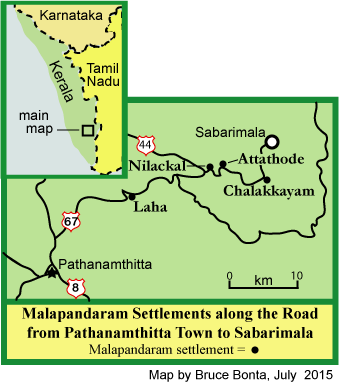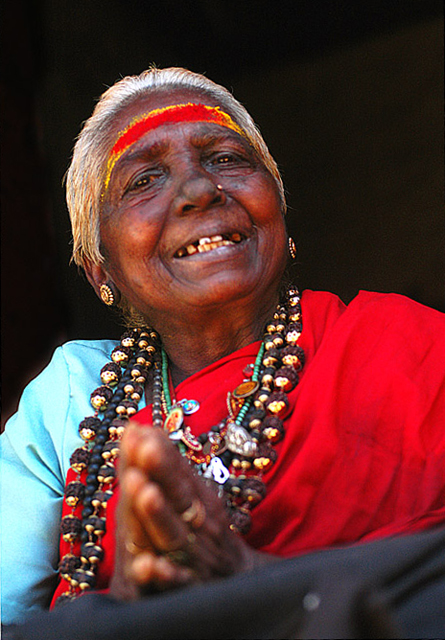When the annual pilgrimage season to Sabarimala got under way in early November, protests by devotees of the Hindu god Ayyappan were threatening to disrupt the lives of the Malapandaram people along the way. The issue is that the Supreme Court of India had ruled that the ancient custom of prohibiting women and girls of menstruating age from visiting the temple complex of the god—he is celibate, after all, so he might be offended—is unconstitutional. The Malapandaram communities along the main road to Sabarimala were unavoidably caught up in the street protests against the court ruling and the ensuing controversy.
 More recent news reports have continued to cover the protests and their impact on the Malapandaram. A news story in late November indicated that there had been so many street protests along the pilgrimage road that the Collector for the Pathanamthitta District, P. B. Nooh, had enacted an order that prohibited people from assembling, blocking the road, holding public meetings, marching, or protesting in any way whenever rumors spread that some women might be daring enough to travel to the temple. The order would not apply to devotees of Ayyappan on their way to Sabarimala, however.
More recent news reports have continued to cover the protests and their impact on the Malapandaram. A news story in late November indicated that there had been so many street protests along the pilgrimage road that the Collector for the Pathanamthitta District, P. B. Nooh, had enacted an order that prohibited people from assembling, blocking the road, holding public meetings, marching, or protesting in any way whenever rumors spread that some women might be daring enough to travel to the temple. The order would not apply to devotees of Ayyappan on their way to Sabarimala, however.
A news report last week explored the impact all of this is having on the Malapandaram that have gained a lot of their annual income from the enormous numbers of pilgrims who normally travel up the mountain to the temple. According to the reporter, the order by the District Collector “has made life miserable” for the Malapandaram in Attathode, one of the tribal communities along the road.
Narayanan Mooppan, an official for the community at Attathode, told the newspaper, The Hindu, that the people are constantly being hassled by the police due to the security order. Anyone who wants to travel to other communities such as Nilackal, Pampa, or Pathanamthitta Town, the headquarters of the district, has to show their identity cards frequently.

Furthermore, the businesses and jobs of many Malapandaram who cater to the needs of pilgrims for much of their annual income—eateries, hotels, and shops—are suffering because so many people are just not traveling this year to the temples. The security curbs have cut back radically on the numbers of travelers, which is undercutting the livelihoods of the Malapandaram. Many of them in normal years would earn money by selling to the pilgrims such minor forest products as honey and frankincense—but not this year.
Another blow has been caused by the Forest Department, which has banned the sale of certain foods to the pilgrims, such as soft drinks, biscuits, pineapples and soft drinks packaged in plastics. This order has also cut into the incomes of the tribal people. A man named Pradeep told the newspaper that the uses of motor vehicles by himself and other Malapandaram in Attathode have been impacted by the increased security. He said that the tribespeople in the community own 50 two-wheelers, three cars, two pick-up vans, two jeeps, and 26 auto-rickshaws. People’s uses of their vehicles are affected by the increased security measures.
Mr. Narayanan, the tribal official, and another Malapandaram, Sujan, told The Hindu that they had addressed pleas repeatedly to the Collector, Mr. Nooh, but he has not responded to them. Mr. Narayanan has also sent a request to the State Human Rights Commission. He told the reporter that about 45 Malapandaram families who are camping in the Sabarimala forests are living in pathetic conditions because they are frequently being forced to move about from one place to another by the forest officials and the police.